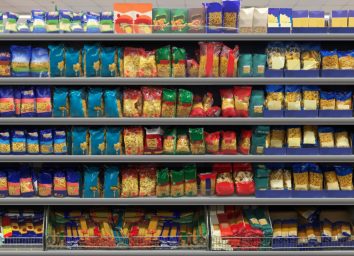Cereal Brands With Questionable Food Quality Practices
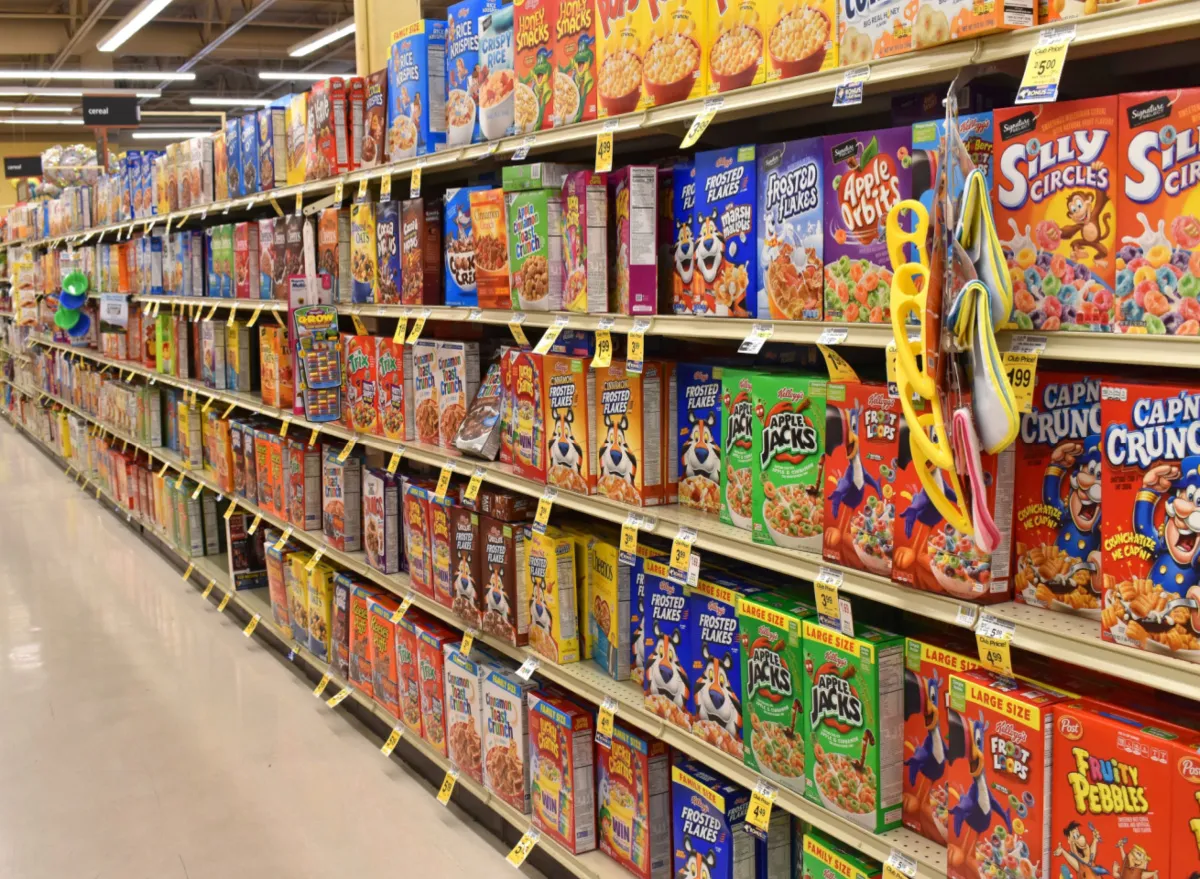
Cereal is the go-to breakfast option for many. It's a quick, convenient way to start the day and doesn't require cooking or much cleanup. As a testament to how much we love cereal, Americans spend $10 billion buying nearly 3 billion boxes of cereal every year. But not all cereals are created equal.
While many cereals claim to be a healthy part of a balanced breakfast, most are just empty calories full of sugar. Slick marketing often fools people into thinking these cereals are good for you. Even worse, some popular cereal brands engage in dangerous food quality practices that could put your health at risk.
Let's take a closer look at the cereal brands you may want to avoid and why.
Watch out for cereals that are highly processed
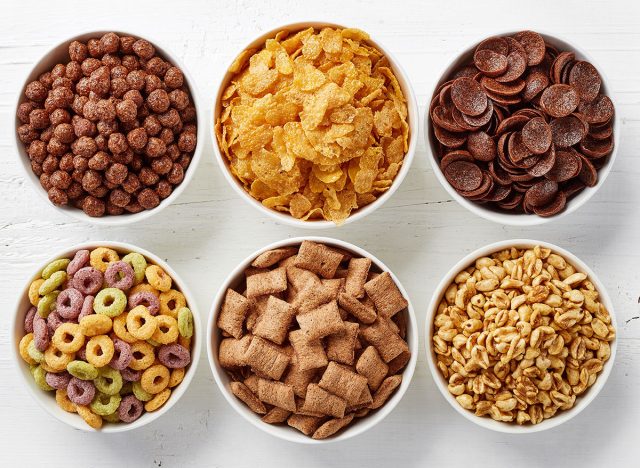
One of the most common pieces of advice you'll hear from doctors and nutritionists is to eat less processed food—and for good reason. Highly processed foods are linked to obesity, heart disease, and even depression. Nearly all popular breakfast cereals undergo some processing to improve flavor, shape, texture, and digestion. However, this removes important vitamins, minerals, and fiber found naturally in cereal grains.
To replace the lost nutrients, cereals are often fortified with vitamins and minerals—sometimes in synthetic forms. Nutrients that are added back in include:
- Vitamin A
- Vitamin D
- B Vitamins
- Zinc
- Iron
Some experts believe we should avoid cereals fortified with synthetic nutrients like folic acid (vitamin B9) due to their impact on our health.
According to Adylia-Rhenee Gutierrez, a certified nutritionist and vegan chef, "Synthetic vitamins are not made from sources of whole food from your diet. Synthetic vitamins are artificial through industrial processing. It should be noted that the FDA does not regulate supplements for their safety nor effectiveness before they are marketed."
Gutierrez is also the inspired creator of Yhorlife, an online wellness and fashion platform. She believes it's always best to get nutrients from whole food sources. And she may be right. Folic acid supplementation has been linked to prostate cancer and other health issues. However, others push back and say that processed cereals aren't necessarily bad for you.
"When it comes to [cereal], research shows that cereal eaters compared to people who don't eat cereal have high nutrient intakes and are more likely to meet nutrient recommendations," says Toby Amidor, MS, RD, CDN, FAND, an award-winning nutrition expert and Wall Street Journal best-selling author of Diabetes Create Your Plate Meal Prep Cookbookwho is also a member of the Eat This, Not That! Medical Expert Board.
She also adds that many of the foods we eat are processed to some degree. Any food that is cooked, sliced, canned, frozen, packaged, preserved, prepared in different ways, or changed nutritionally is considered to be processed. Manufacturers also add a bunch of sugar during processing to make their cereals highly palatable. Many times sugar is the second or third ingredient listed. Added sugar can be dangerous and has been linked to obesity, diabetes, and heart disease.
But Amidor says there are plenty of alternative brands that are lower in sugar and that it shouldn't outweigh the multiple health benefits of cereal. Gutierrez adopts a more cautious approach.
"Any large consumption of sugar is a concern due to the effects of sugar on the body. It has been proven that high sugar consumption contributes to obesity and other serious health issues," she says.
Some popular cereals may contain toxins
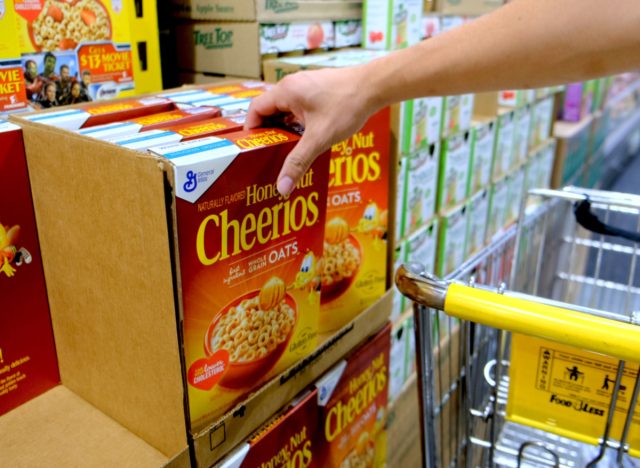
Could your breakfast cereal be poisoning you? Well, it depends on who you ask and what research you look at.
A leading FDA-registered food safety testing laboratory found high levels of glyphosate in Cheerios. Glyphosate is a weed-killer found in Roundup. Growing research suggests it can disrupt the immune system and damage cells.
Amidor says trace amounts of glyphosate can be found in most food products due to its widespread use. But, she says, "The amount of glyphosate found in any cereal is so small you would have to eat over 100 pounds of cereal a day for the rest of your life to even reach the safety levels the government set. When it comes to Cheerios, the trace amounts of glyphosate some have claimed to find are much lower than the amount that the EPA considers safe for human health in oats."
She also says that both the United States Food and Drug Association (USDA) and the Environmental Protection Agency (EPA) have concluded that there is no link between trace amounts of glyphosate and cancer. However, other organizations disagree. For example, in 2017, the International Agency for Research on Cancer (IARC) labeled glyphosate as "probably carcinogenic" in humans.
The European Union has also set an acceptable daily limit for glyphosate that is six times lower than one set by the EPA. The fact that regulatory agencies can't agree on a healthy limit shows that the research is still not clear on the toxic effects of glyphosate. Gutierrez says studies have found that chronically ill humans have higher glyphosate residue in their urine than healthy humans. Clearly, the jury is still out on the harmful effects of the herbicide. There's also the issue of heavy metals like mercury, lead, cadmium, and arsenic.
Multiple congressional reports have found high levels of arsenic in popular baby cereals, including Beech-Nut and Gerber. This has led to mass recalls of the products. The reports also found that these companies rarely test their products for heavy metals. Even when they test, they still allow products exceeding the limit to go to market. These are troubling findings because heavy metals can be quite dangerous, especially for kids. In addition, they can lead to lower IQs, behavior problems, and attention deficit hyperactivity disorder.
Amidor maintains that baby cereal manufacturers are cleaning up their act, and the majority are now adhering to FDA standards. Recently, over 7,000 people reported symptoms of food poisoning, including diarrhea, nausea, vomiting, and stomach cramps after eating Lucky Charms and Cheerios—both General Mills brands. The company performed a health investigation and claimed they found no evidence the cereals were related to the illnesses.
Gutierrez thinks it could be a toxic substance found in these cereals called trisodium phosphate, which has the potential to cause similar symptoms. But this isn't the first time a breakfast cereal has been linked to food poisoning. In 2018, Kellogg's Honey Smacks caused an outbreak of salmonella across 36 states that led to 34 hospitalizations. Kellogg also recalled 28 million boxes of Froot Loops, Apple Jacks, Corn Pops, and Honey Smacks in 2010 due to a bad smell and taste from the package liners.
More reasons to stay clear of these brands.
Avoid potentially harmful preservatives
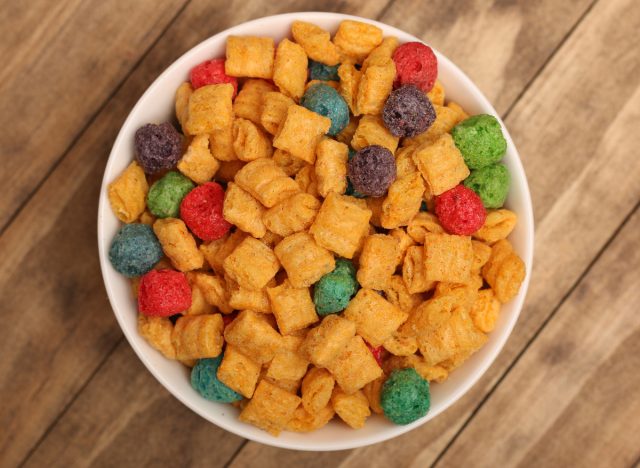
BHA and BHT are preservatives found in many kinds of cereal and other foods that help the product last longer. The International Agency for Research on Cancer, part of the World Health Organization, says that BHA may be cancer-causing.
However, Amidor says no research has found BHT to cause cancer. Since BHT and BHA are similar compounds, it stands to reason that BHA is safe as well. But Gutierrez says that these preservatives can cause allergic reactions in babies and reaffirms that they are carcinogens.
It's probably best to avoid BHA and BHT if you can—at least until more research comes out.
Aggressive marketing to kids
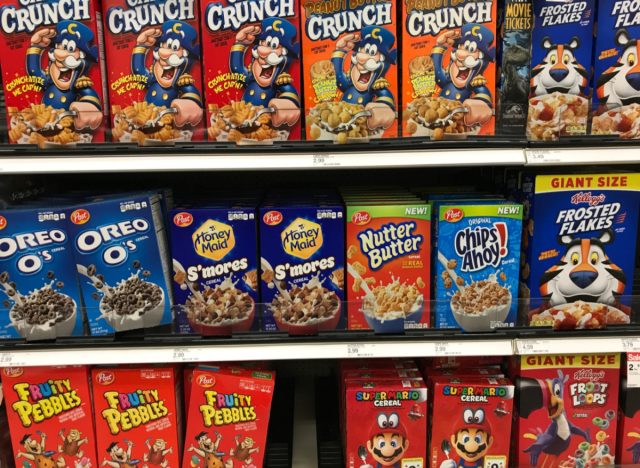
Walk down the cereal aisle, and you'll notice that most boxes have colorful, vibrant packaging designed to catch the wandering eye of little kids. What's more, cereal brands often feature kid-friendly, lovable cartoon mascots like Tony the Tiger and Cap'n Crunch. Of course, these are intentional. Cereal companies have long marketed their products—often their most unhealthy ones—towards kids. They know that kids are highly impressionable and are susceptible to clever marketing and advertising.
Total media spending on cereals advertised to kids increased 34% from 2008 to 2011. General Mills and Kellog are the worst offenders, with a combined marketing budget of $250 million.
"The most concerning thing about this marketing angle is that this is the beginning of addiction to convenience. We are setting our kids up to be predisposed for the health risks of highly processed foods. What is also troubling is that we are getting them conditioned to the best, and most addictive taste—sugar and salt," Gutierrez says.
One report found that cereals marketed towards kids had 50% more sugar and sodium and less than half the fiber of adult-targeted ones. Some companies do provide healthier, lower-sugar alternatives. However, these are marketed towards parents, not kids. Even more troubling, nine out of every 10 cereal ads that children see are for products that contain more than 25% sugar.
But Amidor isn't worried. She believes standards for responsible marketing have changed in recent years. As an example, she says General Mills is a participant in the Children's Food and Beverage Advertising Initiative (CFBAI), which sets limits on sugar, calories, and TK. Companies that participate in the CFBAI are prohibited from marketing to children under 13 for any product that does not meet these standards.
However, a recent report from the Rudd Center for Food Policy and Health at the University of Connecticut found that little has changed. Instead, cereal companies simply use loopholes in the CFBAI guidelines that still allow them to market their unhealthy products to kids.
The Bottom Line
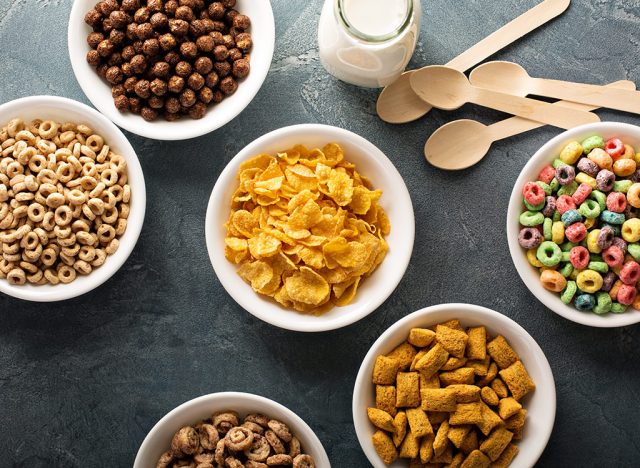
It's clear that major cereal companies do not always have the consumer's best interest in mind when it comes to health. So don't be fooled by pretty packaging or advertising that highlights more fiber. Often, these are just tricks to cover up the sugar-laden product underneath.
So what can you do to protect yourself?
If you're worried about glyphosate, choose organic cereals. Gutierrez says organic is a better choice since it's free from artificial additives and colors. And make sure to check the nutrition profile before you buy your cereal as well. You can also check Consumer Reports to see which cereals are the healthiest–and unhealthiest.
As Amidor states, "There are many options so you can choose the one that meets your nutritional, taste, and cost preferences."
That's good advice. The important part is to become invested in your health so you can make conscious decisions about what you and your children are eating.

